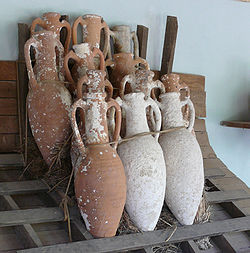The small town of Ipplepen is located in the southwest corner of England, in South Devon. As of 2011, Ipplepen is a small town with fewer than 3000 residents. Although it has such a small population, the area has a very long history, with settlements stretching back to the Iron Age. Since 2010, archaeologists from the University of Exeter and the British Museum have been excavating the sites, which in total span 1200 years of history.
Recently, a team has excavated several locations containing garbage from the end of the Roman era. Analysis of the recovered artifacts has allowed researchers to piece together elements of the residents’ lives, such as their diet. In the garbage piles, animal bones have been preserved for thousands of years. According to the lead archaeologist on the team, Stephen Rippon, these animal can be used “to reconstruct past patterns of farming…Some of the bones that have been found have cut marks from when they were butchered.” The age of the animals when they were butchered gives information about local farming practices. For example, lambs would have been killed for meat, whereas older sheep would have been kept around for milk and wool. Through reconstructing the diets and farming practices of Roman-Age South Devon residents, researchers are able to better understand the area’s history.
The garbage has also provided clues into the financial status of the town. Among the artifacts recovered are some pieces of ancient pottery. Some of it is amphora, a type of pottery used to carry olive oil and wine made in the Mediterranean. Elsewhere at the site, a piece of an expensive cup was discovered. The style of the cup suggests that it was originally made in southeast England, and likely would have been someone’s valuable possession (until it broke). Residents were not, then, just poor farmers, as one might be inclined to think. Instead, these artifacts suggest that at least some of the residents were well-off, since they could afford Mediterranean wine and expensive pottery.
Throughout the Ipplepen excavation, researches have made a number interesting discoveries about the history of South Devon. Among those are a Roman road that once ran through the area, a graveyard from medieval times, and roundhouses from the end of the Iron Age. But trash tells a different, less obvious story than these structures do; it tells us about the day-to-day things that people did that they didn’t view as remarkable, such as eating meat and drinking wine. However, to an archaeologist, these discoveries provide valuable information about the living habits and status of a people or a settlement, such as in South Devon.
Sources:
Phys.org
2017 “Rare Archeological Find Could Be the First Time Unique Pottery Seen in the Southwest.” Archaeology & Fossils, Phys.org. Electronic Document, June 28, 2017, https://phys.org/news/2017-06-rare-archaeological-unique-pottery-south.html, accessed 13 September 2018.
University of Exeter
2018 “Ancient Household Waste Gives More Clues About Devon’s Roman History.” Research News, University of Exeter. Electronic Document, September 5, 2018, http://www.exeter.ac.uk/news/research/title_679888_en.html, accessed 12 September 2018.
Wikipedia
2018 “Ipplepen.” Wikipedia. Electronic Document, September 8, 2018, https://en.wikipedia.org/wiki/Ipplepen, accessed 12 September, 2018
Image Sources:
Ipplepen Archaeological Project.
2016 “2016 Excavation Day 2.” Ipplepen Archaeological Project (blog), June 8, 2016, http://ipplepen.exeter.ac.uk/2016/06/2016-excavation-day-2-7th-june/, accessed September 15, 2018.
Wikipedia.
2018 “Amphora.” Wikipedia, https://en.wikipedia.org/wiki/Amphora, accessed September 15, 2018.
Further reading:
“Digging Up the Roots of Modern Waste in Victorian-Era Rubbish”: https://www.npr.org/sections/parallels/2016/06/01/480268469/digging-up-the-roots-of-modern-waste-in-victorian-era-rubbish
“Trash or Treasure?”: https://www.cnn.com/2011/10/04/world/europe/archaeology-ancient-trash/index.html


